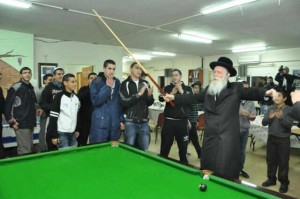Do you remember that it was Chanukah, just a week ago? What do we take away from it? What do we take away from eight days of lighting candles (what’s so “spiritual” about that?), of saying Hallel (that’s pretty “religious”), thanking God (also “religious”) and maybe eating latkes. Oh, yeah, and playing dreidel. That’s very extremely religious, somehow. (Can’t believe that I didn’t spin a dreidel this past Chanukah. Then again, I was spinning myself around, taking care of Mother, so that counts for something.)
We tweeted one Chanukah day that one reason Chanukah is eight days, rather than seven, is to teach us that Chanukah never ends. We need to—we want to—keep on thanking Hashem, from this world clear into the next world. Thanking Hashem not only implies recognizing that you are being cared for, benefitted and that you owe something to the Giver, it is all of these. It is recognizing and communing with the Giver.
The more we thank Hashem for, the more He shines His light of goodness into the world. The ideal height for light the Chanukah menorah is between about 11–35 inches, a third of a meter to just under a meter. Why so low? It’s impossible to gauge the depth of wisdom encapsulated by the light of the Chanukah light, or even of its oil or its wick. But we are human and we are Jews. We are created with a desire to understand, to “explain” and “theorize” as much as we can. We find life so much easier when we (think we) know “why.”
But our Sages, who told us to light, told us that Chanukah light/luminosity is not meant to be used like ordinary light, even if we want to use it to learn Torah. It is a light placed low because we have to reflect on the humble, less glorious parts of life. We need to silently reflect that this great light is not only for the brain, or for the geniuses. It is a light for all of life, even the mundane and profane parts. It is a light for all of us, when we (think we) know and when we (realize that we) don’t know.
Because often, when we don’t know that’s when we can know the most. When we think we know or have the answers, we miss information, instruction and inspiration. By putting the Chanukah lights “off limits” and in “the strangest of places” (to light a light), our Sages are sending us a message: Be humble; be open; be aware. This is how we continue to be thankful and get to be more thankful.
Eight nights. Full circle and then some. It’s a long winter. You never know how dark or cold it’s going to get. Make sure to carry Chanukah with you. And don’t thank me; thank God.
© Copyright 2013 O. Bergman/148West

